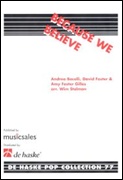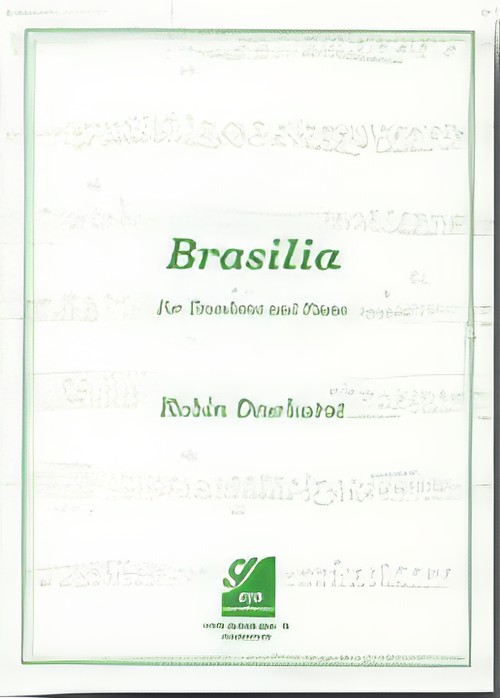Results
-
 £54.99
£54.99BECAUSE WE BELIEVE (Brass Band) - Foster, David - Stalman, Wim
This song was written by David Foster, who has also penned many previous hits which have been performed and recorded by such artists as C?line Dion, Lionel Richie, Madonna and Michael Bubl?. Because We Believe owes its fame to the performance by Andrea Bocelli during the closing ceremony of the Winter Olympics held in Torino during 2006. Finish any concert with this great anthem and your audience will leave with a great feeling of well-being!
Estimated dispatch 7-14 working days
-
 £24.95
£24.95BLESS 'EM ALL (Brass Band Marchcard) - Beechfield Carver, Peter
Marchcard size. Bless 'Em All (also known as "The Long And the Short and the Tall" and another title - not Bless) is a war song credited to have been written by Fred Godfrey in 1917. It gained popularity during the Second World War as a patriotic tune after being performed by singers such as Gracie Fields.
Estimated dispatch 7-14 working days
-
 £44.95
£44.95Brasilia (Trombone Solo with Brass Band - Score and Parts) - Dewhurst, Robin
From the Robin Dewhurst collection, this multi-talented young composer has produced a simply wonderful solo for trombone and brass band. Premiered by virtuoso Brett Baker, this latin-styled work reaches its climax in a stunning cadenza for soloist supported by percussion section. (Also available with piano accompaniment).
Estimated dispatch 7-14 working days
-
 £60.99
£60.99Cantique de Noel (Brass Band - Score and Parts)
The French composer Adolphe Charles Adam's (1803- 1856) carol Cantique de No?l (better known in France as Minuit, Chr?tiens, and also widely known as O Holy Night) was initially criticised by church authorities who observed a lack of musical taste and the absence of religious perception. How wrong they were is now clear as the song is popular worldwide and is often performed in churches as well as carol concerts. Roland Kernen has produced this beautiful version of Cantique de No?l for brass band. 03:45
Estimated dispatch 7-14 working days
-
 £45.00
£45.00Caribe (Brass Band - Score and Parts) - Camilo, Michel - Harper, Philip
An absolute showstopper in Latin style, this features solos for horn, baritone and cornet, amongst others. Simplified lines are also offered, but the full effect can be heard on Cory Band's CD Summon the HeroesSuitable for Championship Section BandsDuration: 3.30
Estimated dispatch 7-14 working days
-
 £32.95
£32.95CAROUSEL, The (Soprano Cornet or Tenor Horn/Brass Band) - Newsome, Roy
Soprano Cornet or Tenor Horn Solo & Brass Band. A separate Piano Accompaniment edition is also available. Solo UK Grade 7
Estimated dispatch 7-14 working days
-
 £42.95
£42.95CHILD BEARER (Brass Band) - Nyman, Michael - Parkinson, John
from the movie The Ogre. Also available from this movie: Magic Forest/Into the Woods/Goering's Hunting Party
Estimated dispatch 7-14 working days
-
 £42.95
£42.95CHRISTMAS POST, The (Brass Band with Post Horn feature) - Koenig, Hermann - Keeley, Ed
Brass Band set including full score. The Post Horn part is provided in Ab, however a Bb trumpet part is also included in the set for greater flexiblity. In 1844, the German cornet player Hermann Koenig wrote Post Horn Gallop for Post Horn with orchestra accompaniment. Its great popularity meant that it has made its way into the brass and wind band repertoires. Ed Keeley has given it a festive twist by including motifs of Jingle Bells, Good King Wenceslas and Here We Come A-Wassailing.
Estimated dispatch 7-14 working days
-
 £72.99
£72.99CINEMANIA (Brass Band) - Finn, Robert
This music sounds as if it came straight off the cinema screen. However, there's no movie for this fantastic score! Just like EVERY good film score, this work also includes moving melodies, fast virtuoso passages and, last but not least, a romantic love theme. The instrumentation takes into account that a group may not be complete and this means that the piece can be played by practically every orchestra. Highly recommended for concerts and competitions.
Estimated dispatch 7-14 working days
-
 £25.00
£25.00CONCERTINO IN E FLAT (Soprano Cornet/Brass Band) - Barry, Darrol
Soprano Cornet & Brass Band. Also available with Piano accompaniment
Estimated dispatch 7-14 working days
